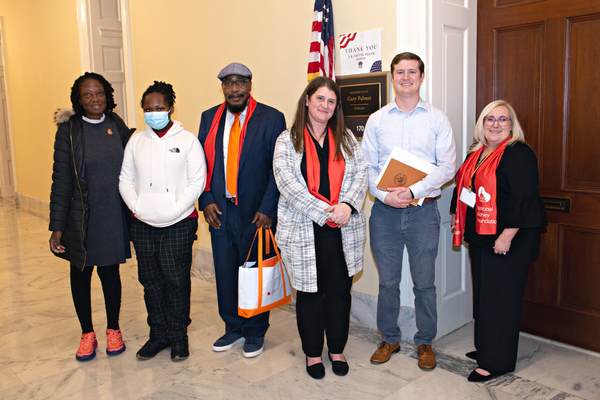Jen Anderson made a selfless decision when she was nineteen–she donated a kidney to her aunt. Many other young adults may have found organ donation frightening, but ...
Pushing for Kidney Disease Screenings to Help the Patients that Need Them Most
- English
- Español
March 15, 2023, 3:05pm EDT
Both the National Kidney Foundation (NKF) and the Coalition for Kidney Health (C4KH), a multi-stakeholder group of partners convened by NKF, recently weighed in on a draft research plan on chronic kidney disease (CKD) screenings authored by the United States Preventive Services Task Force (USPSTF). Our focus is detecting kidney disease earlier and helping patients nationwide better manage their condition.
Focusing on a national response to CKD
CK4H is working to transform the landscape of kidney disease care by:
- Fostering greater awareness of CKD
- Increasing screenings for at-risk patients
- Driving high-quality, coordinated programs that focus on delaying kidney disease progression
The topic of kidney disease screenings is one of several that the USPSTF is currently developing a research plan around, with an eye toward establishing evidence-based practices to guide their recommendation process. NKF and the C4KH's comments underscored the urgency around this process due to "the significant burden of CKD on patients and current under-diagnosis of CKD even among patients with advanced illness."
Prioritizing at-risk patients
While applauding the USPSTF for initiating this process, our comments are also a call to action toward amending the current research plan so that patients with conditions commonly associated with kidney disease, including hypertension and diabetes, are included in the grouping of patients recommended for screening. Engaging in a systematic review that allows for the stratification of screening recommendations, as USPSTF does in mammography, diabetes screening, and other areas would greatly benefit these at-risk populations.
Comments also emphasized the importance of amending the current contextual framework to explore:
- The benefits of kidney disease screening and diagnosis
- CKD's disproportionate impact on communities of color
- CKD under-diagnosis among at-risk populations
- The effectiveness of CKD interventions
For the patients affected by kidney disease, the harms of screening are few, but the benefits are myriad. Failure to screen, which is currently all too common, can result in catastrophic but avoidable damage.
Kidney disease is the tenth leading cause of death in the United States, with around thirty-eight percent of patients learning of their diagnosis only after their kidneys have failed.1 These patients "crash" into dialysis in the emergency room, a traumatic experience that increases mortality and creates an economic burden. Non-invasive, cost-effective testing to assess kidney function via eGFR and albumin-to-creatinine ratio (uACR) could save lives and lower healthcare system costs.
Learn more about testing for kidney disease.
What's next?
We look forward to continuing the conversation and concluding this process in which kidney disease screening is easily integrated into primary care practice for the at-risk patients that need it most.
As the coalition noted, "CKD must become a public health priority due to its significant national and worldwide prevalence, the burden it takes on patients, and its cost to our healthcare system."
Tell Congress to support kidney policy priorities like increased funding for kidney disease awareness, early detection, and screening.
Big victories are possible with your voice
Together, we can make kidney disease a public health priority and enhance the lives of kidney patients by making our voices heard in support of the issues affecting funding, treatment, research, and more. Become an advocate today.
Works Cited
1Molnar, A.O., Hiremath, S., Brown, P.A. et al. Risk factors for unplanned and crash dialysis starts: a protocol for a systematic review and metaanalysis. Syst Rev 5, 117 (2016). https://doi.org/10.1186/s13643-016-0297-2
Related content
For the first time in four years, patients and NKF staff from across the country kicked off National Kidney Month and the 10th annual Kidney Patient Summit by meeting ...


